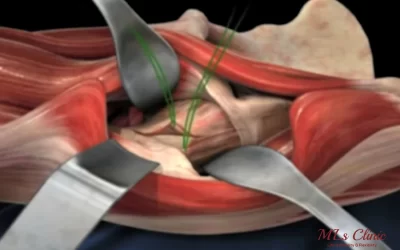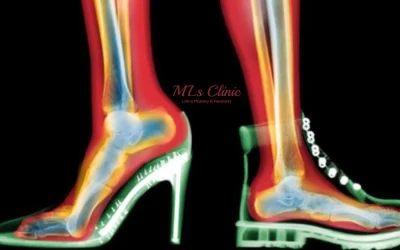The Myths About Frozen Shoulder: Truths You Need to Know about it.

The term “Frozen Shoulder” is one many people have come across, but despite its familiarity, several myths surround this condition. Before diving into myths about frozen shoulder and clearing them up, it’s essential to first understand what frozen shoulder really means. Check out the video by the best orthopedic doctor in Indore, Dr. Preetesh Choudhary on Frozen Shoulder.
Frozen shoulder, or adhesive capsulitis or periarthritis of shoulder, is a condition characterized by stiffness, pain, and limited movement in the shoulder joint. It occurs when the shoulder capsule thickens and tightens, leading to the formation of thick tissue bands and a decrease in synovial fluid, which lubricates the shoulder joint. This results in restricted shoulder movement and significant discomfort.
Frozen Shoulder typically develops in three stages:
- Freezing stage (pain and loss of motion),
- Frozen stage (stiffness with less pain), and
- Thawing stage (gradual improvement in movement).
Shoulder pain doctor focuses on reducing pain and restoring mobility. Nonsteroidal anti-inflammatory medications (NSAIDs) and corticosteroid injections can help manage pain and inflammation. Physical therapy plays a crucial role in stretching and strengthening the shoulder to improve range of motion. In severe cases where conservative treatment is ineffective, surgical options like shoulder arthroscopy may be considered to release the tight capsule and restore mobility.
Uncovering the truth behind common myths about Frozen Shoulder
Myth 1: Frozen shoulder only affects older adults.
One of the widespread myths about frozen shoulder is it exclusively affects older adults. While it’s true that the likelihood of developing frozen shoulder increases with age, the condition can occur in people of all ages. Younger individuals can also be at risk, particularly if they have certain medical conditions, injuries, or experience prolonged immobility, which can contribute to the development of frozen shoulder, regardless of their age.
Myth 2: Frozen shoulder can’t be entirely prevented.
Since the exact cause of frozen shoulder remains unknown, preventing its onset is not possible. The good news is that you can reduce complications by regularly performing exercises and stretches to alleviate stiffness and pain. However, it’s important to avoid overexertion and only exercise within your pain tolerance.
Myth 3: Frozen shoulder is merely temporary stiffness.
A common misconception about frozen shoulder is that it’s just temporary stiffness that will resolve on its own. In reality, while some improvement can occur over time, recovery is often slow and can take several months or even years. Without timely treatment by shoulder pain doctor, the condition can lead to persistent pain, loss of mobility, and muscle weakness, significantly affecting everyday tasks and quality of life. Early intervention is crucial to manage the symptoms effectively, prevent further complications, and restore movement as soon as possible.
Myth 4: Cold weather causes frozen shoulder.
Despite the common belief, frozen shoulder is not caused by cold weather. The term “frozen” refers to the stiffness and immobility of the shoulder joint, not to temperature. While the precise cause of frozen shoulder is still unclear, it is thought to involve inflammation and thickening of the shoulder capsule, which restricts movement.
Myth 5: Surgery is not the initial treatment for Frozen Shoulder.
Orthopedic doctor in Indore, Dr. Preetesh Choudhary typically recommends starting with conservative treatments, such as nonsteroidal anti-inflammatory medications and physical therapy to improve shoulder flexibility through stretching. Steroid injections may also be considered to help alleviate symptoms.
However, if these methods do not provide relief, surgery may become necessary, particularly during the “frozen” stage. This surgical option usually involves Shoulder Arthroscopy, a minimally invasive procedure to remove scar tissue and release the stiffened joint capsule, followed by manipulation under anaesthesia.
Myth 6: Painkillers alone can cure frozen shoulder.
Some believe that painkillers or anti-inflammatory medications are enough to treat frozen shoulder. While these medications can help reduce pain and inflammation, they don’t address the root cause or improve joint mobility. Effective treatment for frozen shoulder typically requires a combination of pain management, physical therapy, and, in some cases, corticosteroid injections or surgery.
Myth 7: Rest is the most effective treatment for frozen shoulder.
Although resting might seem like a reasonable way to manage the pain and discomfort of a frozen shoulder, prolonged immobility can actually make the condition worse. Gentle exercises and stretching are essential to maintain joint mobility and prevent further stiffness. Physical therapy is a vital part of treating frozen shoulder, as it helps restore range of motion and strengthens the surrounding muscles.
Contact us at MLs Clinic, today if you think you may have a frozen shoulder, and let our orthopedic doctor in Indore, Dr. Preetesh Choudhary assist you in achieving a better quality of life.







